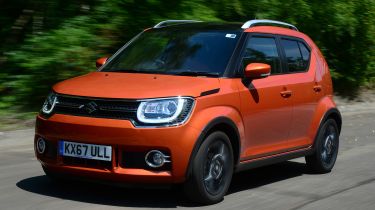Used Suzuki Ignis (Mk2, 2017-date) review
A full used buyer's guide on the Suzuki Ignis covering the Ignis Mk2 that's been on sale since 2017
Verdict
The Mk1 Suzuki Ignis was rather forgettable in pretty much every way, but its successor is a lot more distinctive and desirable. With its modern micro-SUV looks and generous equipment levels, the Suzuki also offers dependability with economy. When we pitched an Ignis against the Renault Twingo, the Suzuki won thanks to its value and performance. We ran an Ignis for 10 months on our test fleet and it soon won us over with its cleverly packaged cabin, manoeuvrability and fuel-sipping engine. We also liked the fact that it came with four-wheel drive; when the weather turns bad, it’s amazing how much safer this tech makes you feel, our reviewers said.
The original Suzuki Ignis was launched in 2003 and it lasted until 2007. Few people noticed when it disappeared, and it would be another decade before its replacement was launched. By then, Suzuki had more of a UK presence and appealed to mainstream buyers that previously would have seen it as a niche brand compared with more familiar European and Japanese marques.
That’s a shame, because while the Ignis is up against some very talented rivals, it offers unrivalled practicality within the class, while also looking like nothing else on the road. When you add in an excellent reliability record and impressive value for money, it makes you wonder why the Ignis isn’t a much more common sight in the UK.
History
The Ignis Mk2 went on sale in the UK in January 2017. There was just one engine available: a 1.2-litre petrol unit rated at 89bhp. This came with a five-speed manual gearbox as standard, but a five-speed automated manual transmission (dubbed AGS by Suzuki) was also available.
Used - available now

2015 Nissan
Qashqai
29,000 milesManualPetrol1.2L
Cash £9,368
2014 Mazda
3
74,000 milesAutomaticDiesel1.5L
Cash £6,898
2015 Volkswagen
Golf
91,000 milesAutomaticPetrol1.4L
Cash £7,780
2017 Lexus
CT
79,780 milesAutomaticPetrol1.8L
Cash £9,980While the Ignis was generally front-wheel drive, there was also a four-wheel-drive option called Allgrip, available only with range-topping SZ5 trim. A mild-hybrid version was only initially offered in the top-spec SZ5, but from September 2019 the option spread to all variants fitted with a manual transmission, including the Allgrip.
Suzuki launched a facelifted Ignis in April 2020, with a CVT automatic option in place of the previous AGS transmission, a more efficient 1.2-litre engine plus a bigger battery for mild-hybrid models.
Which one should I buy?
Most Ignises have mild-hybrid tech, and this is useful to boost low-down torque more than anything, although it does help marginally with improving fuel economy.
A quarter of Ignises have four-wheel drive (priced from £11,000), and while economy suffers significantly, an Allgrip edition does give a greater sense of security when in really difficult weather conditions.
The entry-level SZ3 is by far the rarest trim level. Buy one of these and you’ll have air-con, DAB radio with Bluetooth, 15-inch steel wheels, front electric windows and privacy glass. The SZ-T adds navigation, a rear parking camera, 16-inch alloy wheels, roof rails, and wheelarch extensions. The SZ5 comes with climate control, automatic emergency braking, keyless entry and start, rear electric windows, plus LED headlights and daytime running lights.
Alternatives to the Suzuki Ignis
Other city cars to consider include the Hyundai i10, which shares much with the Kia Picanto and offers the same package of value, reliability and availability. Giving the Kia and Hyundai a hard time are the VW Group trio of Volkswagen up!, SEAT Mii and Skoda Citigo, which have been around a long time but are still impressive thanks to their big-car feel, excellent build quality and engaging dynamics.
The MG3 is a less mainstream choice, but one that’s worth considering for its value and impressive driving experience. More obvious is another closely related trio in the forms of the Citroen C1, Peugeot 108 and Toyota Aygo, which are plentiful and good value for money. The Renault Twingo and its cousin, the Smart ForFour, are worth a look also, along with the Fiat Panda.
What to look for
Seating
The SZ3 has a fixed rear seat but room for five, whereas the SZ-T and SZ5 have space for four people only, and a sliding rear seat.
Warranty
If your Ignis is three years old and warranty-expired, having it serviced by an official dealer extends the warranty to up to seven years.
Gearbox
The original auto is an automated manual, which works okay around town, but on the open road it feels less slick. The later CVT auto is better.
Spare wheel
The Ignis comes with a can of tyre sealant, but space-saver spare wheels are available and there is a well under the boot floor for storage.
Safety
No car this size is going to be as safe as a mid-sized SUV or large family car, but the Ignis is decently strong. But Euro NCAP marked the Ignis SZ3 down to just three stars because it lacks some of the safety kit and driver-assistance systems of the SZ-T and SZ5, the latter scoring five stars.
Interior
The funky exterior design is echoed by the imaginative styling inside. But while it all seems appealing and is generally user-friendly, some of the materials look and feel a bit cheap.
But what really impresses is the amount of space in the Suzuki’s cabin. There’s plenty of room for two adults in the back, but not three in some models, where only a pair of seatbelts is fitted.
Boot space is respectable, at 267 litres (or 204 litres for Allgrip models), rising to 1,100 litres with the back seat folded (or 1,086 for Allgrip models).
Prices
We found almost 600 Ignises for sale and a quarter of them had an automatic gearbox, while almost three quarters of the Ignises on the market are fitted with hybrid tech. There’s an equal number of SZ-Ts and SZ5s, which account for more than 90 per cent of the cars available, the remainder being SZ3s.
To check prices on a specific model head over to our valuation tool.
Running costs
All Ignis models need to be serviced every 12 months or 12,500 miles. The first three services are priced at £179, £341 and £278; the last one includes the car’s first MoT. Services then alternate between Major and Minor, at £341 and £278 respectively, until the car is seven years old, when the service schedule runs Minor, Interim and Major at £149, £219 and £299.
The coolant first needs to be replaced after eight years or 100,000 miles, and then every four years or 50,000 miles after that; budget around £100 for this to be done. Fresh brake fluid is needed every two years or after 25,000 miles, at £60, although this is included in the service cost. The Ignis engine is chain-driven, so there is no cambelt to replace.
Recalls
Suzuki has a pretty good record when it comes to recalls, and this is borne out by the fact that the company has issued just two recalls for the second-generation Ignis so far. They were launched back in March 2018, and both actions also affected the Baleno and the contemporary Swift.
The first campaign was launched on 13 March for Ignises made up to November 2017, because faulty software could prevent the car’s battery from charging, leading to all electrical power being lost and the car potentially being left stranded in the dark with no lighting.
Just 10 days later a second recall was issued for Ignises made in February 2017. This time the drive belt for the stop/start system could fail, leading to the car’s engine overheating or failing to start.
Driver Power owner satisfaction
The only Suzuki that’s included in our annual Driver Power survey is the Vitara. Suzuki does appear in our Brands poll, coming 14th in 2021, 21st in 2022 and 22nd in 2023 out of 29 car makers. Reliability, value and low running costs are the high points, but build quality disappoints, although Suzuki had the lowest percentage of reported faults in the 2023 survey. Owner reviews on carbuyer.co.uk are positive.
Looking to sell your current car quickly and for a good price? Try our Free Car Valuation tool today!








